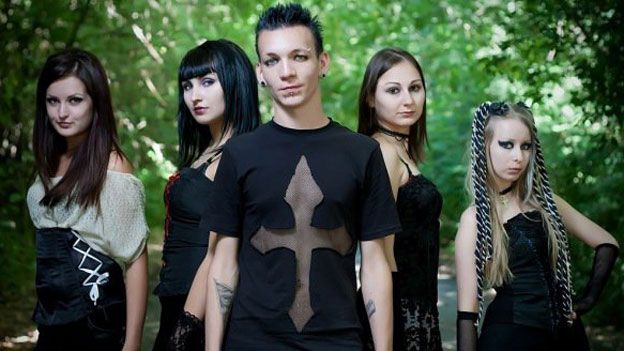The last goths of Tashkent
- Published

The desecration of a cemetery in Tashkent has been blamed on goths, and two have been arrested. But members of this dwindling community say this is the kind of persecution that is forcing many of them to leave the country.
With their pale painted faces, carefully sculpted dyed-black hair and heavy eyeliner, goths are not a common sight in the predominantly Muslim central Asian nation of Uzbekistan.
The youth subculture has had a small presence on the streets of the capital, Tashkent, since the 1990s.
A fascination with gothic horror, Victoriana and pagan-inspired flouncy fashion in dark moody colours is not normally a sign of political dissent. But goths here believe they are increasingly being targeted by the authorities who, they say, show little tolerance for alternative lifestyles.
When graves in the oldest Christian cemetery in Tashkent were desecrated recently, police were swift to arrest two young men they labelled as "goths".
But goths there have vociferously denied that anyone in their community could have had anything to do with the vandalism at the Botkin cemetery.
The graveyard dates back to 1872 and young Uzbek goths say the place is treasured for its leafy tranquillity and a romantic atmosphere tinged with morbidity - all qualities that goths find compelling.
"I liked walking with my friends in the leafy, shadowy quiet alleys of the cemetery, looking at old sculptures and discussing gothic art," says Leticia, one of the few remaining goths in Tashkent.
"We have respect for graves, we even romanticise death," she added.
Leticia is a striking 18-year-old who attracts a lot of attention wearing a long black leather dress and a large cross around her neck. She became interested in goth culture while studying in Poland and through her love of classical music. Her father, who is German, supports her lifestyle choice, but her mother is more uncertain.
But Leticia herself remains committed. "To me, being a goth is a way of life," she says. "Once a goth, always a goth."
She says she can count barely 200 goths in Uzbekistan, a country with a population of 30 million. She knows most of them through Facebook where her friends list their second name as Manson - a tribute to their hero, American singer Marilyn Manson.
In a bar in Tashkent, Leticia and her pierced and tattooed friend Gotya described the intense pressure they now feel because of what they describe as prejudice amid a series of alarming developments.
Goths used to meet up in Tashkent's only Roman Catholic church, but they are now banned from entering it. Concerts of their favourite local band, Festa Martyria, who perform in a gothic style, have been cancelled since last year.
And of greater concern to them is the fact that youths dressed in gothic fashion are likely to be harassed in public. A number are arrested and then released without charge, they contend.
They claim that the government, by arresting the goths accused of vandalising the cemetery, is looking for an excuse to ban alternative youth groups altogether.
But the pressure is even greater for girls from a Muslim background who turn to the goth aesthetic and start wearing accessories like crosses and skulls.
This creates significant public consternation and local media have even been at the vanguard of a backlash against alternative cultures.
There has been a campaign in Uzbek media denouncing Western mass culture for encouraging "immorality" among the youth and for "damaging the country's national values and traditions". Rap, rock and heavy metal have been labelled "alien music" and some genres have been subsequently banned.
Recently even Russian state TV broadcast claimed that goths engage in cannibalism. Many Uzbeks watch Russian television and are influenced by such coverage.
During one punk rock concert during the last two years, masked police turned up in large numbers and began rounding up the fans, detaining some for several hours.
The BBC tried to get a response from the Uzbek authorities, but they did not provide any. They do not respond to queries, saying the BBC is not accredited in Uzbekistan.
At a well-known club on the outskirts of Tashkent, an event that in the past might have attracted up to 300 people, now only draws about 20 or 30. Most tried to avoid the camera.
"Why do the authorities ban our looks?" wondered one person, who wished to remain anonymous.
A former member of the heavy metal band The Rebels, known as Dilshod, himself from a Muslim background, says that pressure from the authorities on alternative youth culture eventually meant his band split up.
Some of his friends left the country. He is also planning to go abroad for a creative writing course.
During the last years of the USSR, there was an explosion of youth cultures.
Gotya's mother used to tell him how Tashkent was a truly cosmopolitan city where Russians, Armenians and Jews all mixed. After the collapse of the Soviet Union, rising nationalism persuaded many to go abroad.
In those days, Gotya's brothers were rockers and he shares their love of rock music. He says that his mother accepted his brothers' looks with their single ear piercings.
"In the past there were lots of goths, punks, satanists and rockers around," says Gotya sadly.
While Uzbekistan appears to be a less-than-hospitable place for such subcultures, Leticia and Gotya too are thinking about emigrating to other countries, like Russia or Poland.
This cannot be good news for a country that has been trying hard to prove itself more attractive to Westerners.